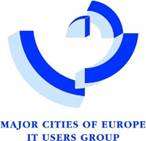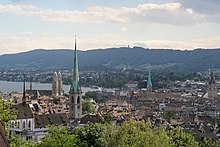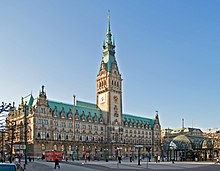E-government is the use of technological communications devices, such as computers and the Internet, to provide public services to citizens and other persons in a country or region. E-government offers new opportunities for more direct and convenient citizen access to government and for government provision of services directly to citizens.
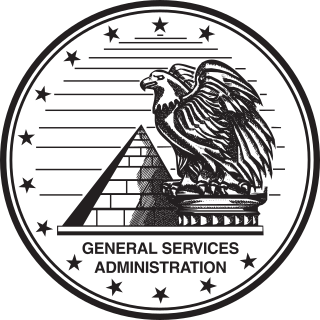
The General Services Administration (GSA) is an independent agency of the United States government established in 1949 to help manage and support the basic functioning of federal agencies. GSA supplies products and communications for U.S. government offices, provides transportation and office space to federal employees, and develops government-wide cost-minimizing policies and other management tasks.
Technology governance means the governance, i.e., the steering between the different sectors—state, business, and NGOs—of the development of technology. It is the idea of governance within technology and its use, as well as the practices behind them. The concept is based on the notion of innovation and of techno-economic paradigm shifts according to the theories by scholars such as Joseph A. Schumpeter, Christopher Freeman, and Carlota Perez.

The Directorate-General for Communications Networks, Content and Technology is a Directorate-General of the European Commission and is responsible for European Union investment in research, innovation and development of critical digital technologies.

The Technical Centre for Agricultural and Rural Cooperation ACP-EU (CTA) was established in 1983 under the Lomé Convention between the African, Caribbean and Pacific Group of States and EU member states. Since 2000 CTA has operated within the framework of the ACP-EU Cotonou Agreement with a mission to “strengthen policy and institutional capacity development and information and communication management capacities of ACP agricultural and rural development organisations. It assists such organisations in formulating and implementing policies and programmes to reduce poverty, promote sustainable food security, preserve the natural resource base and thus contribute to building self-reliance in ACP rural and agricultural development.”. The centre is closed in 2020, after the end of the Cotonou Agreement and the subsequent end of its financing.
Electronic participation (e-participation) refers to the use of ICT in facilitating citizen participation in government-related processes, encompassing areas such as administration, service delivery, decision-making, and policy-making. As such, e-participation shares close ties with e-government and e-governance participation. The term's emergence aligns with the digitization of citizen interests and interactions with political service providers, primarily due to the proliferation of e-government.
The digital economy is a portmanteau of digital computing and economy, and is an umbrella term that describes how traditional brick-and-mortar economic activities are being transformed by the Internet and World Wide Web technologies.
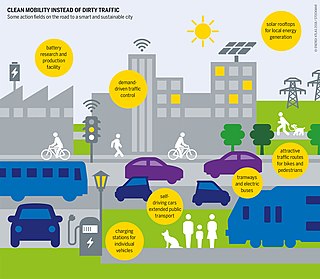
A smart city is a technologically modern urban area that uses different types of electronic methods and sensors to collect specific data. Information gained from that data is used to manage assets, resources and services efficiently; in return, that data is used to improve operations across the city. This includes data collected from citizens, devices, buildings and assets that is processed and analyzed to monitor and manage traffic and transportation systems, power plants, utilities, urban forestry, water supply networks, waste, criminal investigations, information systems, schools, libraries, hospitals, and other community services. Smart cities are defined as smart both in the ways in which their governments harness technology as well as in how they monitor, analyze, plan, and govern the city. In smart cities, the sharing of data is not limited to the city itself but also includes businesses, citizens and other third parties that can benefit from various uses of that data. Sharing data from different systems and sectors creates opportunities for increased understanding and economic benefits.
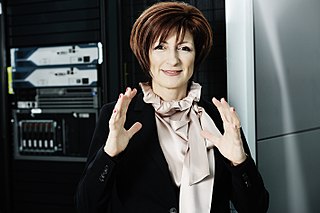
Sasha Bezuhanova is a Bulgarian public figure – business leader, investor and philanthropist with 20-years executive business career in HP and a multi-dimensional track record of service to society.
The United Arab Emirates (UAE) once largely known for its oil exports today has a diverse and highly developed economy. According to the UAE Economic Report 2009 released by the UAE Ministry of Economy in May 2010 the non-oil sector contributed 71.6 per cent to the UAE’s GDP, compared to 66.5 per cent in 2008, underscoring the success of the nation's economic diversification initiatives.

The World Resources Forum (WRF) is a non-profit organisation for sharing knowledge about the economic, political, social and environmental implications of global resource use. WRF promotes resource productivity among researchers, policymakers, business, NGOs and the public. In addition to organizing international and regional conferences, the WRF Secretariat coordinates multistakeholder dialogue projects, amongst others the Sustainable Recycling Initiative (SRI) as well as the H2020 projects Towards a World Forum on Raw Materials (FORAM), and CEWASTE. The WRF contributes to other EC-projects and projects with the German development organisation GiZ, UNEP and UNIDO.

Atef Helmy Nagib is an Egyptian communication and technology expert and the former minister of communications and information technology.
Information and communication technology (ICT) in Kosovo has experienced a remarkable development since 1999. From being almost non-existent 10 years ago, Kosovar companies in the information technology (IT) domain offer today wide range of ICT services to their customers both local as well as to foreign companies. Kosovo has the youngest population in Europe, with advanced knowledge in ICT.
The Malta Information Technology Agency is a Maltese government agency under the Office of the Prime Minister. MITA manages the implementation of IT programmes in Government to enhance public service delivery and provides the infrastructure needed to execute ICT services to Government. MITA is also responsible to propagate further use of ICT in society and economy and to promote and deliver programmes to enhance ICT education and the use of ICT as a learning tool.

Joanna Truffaut is a French Digital transformation advisor and entrepreneur. Truffaut has played an influential role in leading awareness creation and developing free Wi-Fi networks in urban areas in the US and France, and has launched Internet start-ups in the Middle East. She now specializes in advising public institutions, cities and media firms on the opportunities and threats of digital experience and technology in their overall business strategy. Truffaut is an alumna of Institut Mines-Télécom and of Virginia Tech.

The Observatory on Digital Communication (OCCAM) was established in 1996 by UNESCO in Milan, with the Agreements signed by the Director General, Federico Mayor and Marco Formentini in June 1996. The acronym stands for Observatory for Cultural Communication and Audiovisual in the Mediterranean.
Digital agriculture, sometimes known as smart farming or e-agriculture, is tools that digitally collect, store, analyze, and share electronic data and/or information in agriculture. The Food and Agriculture Organization of the United Nations has described the digitalization process of agriculture as the digital agricultural revolution. Other definitions, such as those from the United Nations Project Breakthrough, Cornell University, and Purdue University, also emphasize the role of digital technology in the optimization of food systems.
The European Association for Biometrics (EAB) is a non-profit organization in the field of biometrics with its headquarters in Bussum (Netherlands). The Association promotes the development of biometrics and its use in Europe, in general in accordance with the law, with the principles of ethics, stimulating the development of technology, increasing security and business.
The African Internet Governance Forum (AfIGF) is a multistakeholder forum that facilitates dialogue on Internet governance issues. It is one of the 19 regional IGF initiatives and aims to address and discuss the issues of all 54 nations in Africa.
